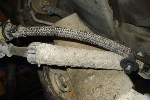TheJMan
Well-Known Member
- Joined
- April 5, 2003
- Messages
- 545
- Reaction score
- 0
- City, State
- Scottsdale, AZ
- Year, Model & Trim Level
- 2009 Mazda 3 Hatchback
I have a 1993 4.0 that has only been changed with 10W-30 conventional oil its entire life. It has 79K miles on it now and I'm wondering if it is too late to switch to a 5W-30 synthetic? The engine uses almost no oil during the 3K mile intervals.
Also, I was cleaning out our garage and found some old AC Delco oil filters that are about 5 to 6 years old and have never been used. Should I toss them and get new ones or are they safe to use? I'm just worried about the rubber gasket being cracked or damaged from sitting in the heat for 5 or 6 years.
One more thing, is it safe to go 6K mile intervals on synthetic with no problems?
Also, I was cleaning out our garage and found some old AC Delco oil filters that are about 5 to 6 years old and have never been used. Should I toss them and get new ones or are they safe to use? I'm just worried about the rubber gasket being cracked or damaged from sitting in the heat for 5 or 6 years.
One more thing, is it safe to go 6K mile intervals on synthetic with no problems?










